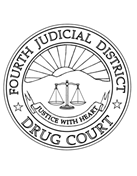El Paso County
Recovery Court
The History and goals of Recovery Court

The original Drug Court in the Fourth Judicial District was one of the first Drug Courts in the state, established in 1999. Recovery Court is a redesigned drug court, with two tracks (formerly Adult Criminal Drug Court (ACDC) and HEALS Court (Healthy, Engaged, and Living Sober)). Our program participants have many types of convictions, ranging from wobbler-eligible DF4’s to other non-violent felonies which are drug-related and/or drug motivated. Recovery Court team professionals decide which track is most appropriate for each defendant based on numerous evidence-based factors. Screening occurs after plea and prior to sentencing, or upon facing revocation of probation. Recovery Court is a sentencing option for the District Court.
The Recovery Court Program utilizes intensive probation supervision and multiple levels of treatment. It is a program for the high risk defendant who has an addiction that is the primary cause of their criminal behavior. Participants must actively engage in treatment, make regular court appearances, complete all urinalysis drug tests, and are intensely supervised by probation and the recovery court team.
We want drug offenders to receive the treatment they need and be able to resume their lives, return to their families’ drug free and gainfully employed.
Benefits to the public:
The 4th Judicial District Recovery Court is modeled after evidence based problem solving drug courts, which have proven to be effective in handling criminal cases of substance abusers by heavily focusing on treatment, close probation supervision, and regular drug testing. These courts have been found to restore lives and prevent future arrests. One of the primary goals of the judiciary is always to protect the public by reducing recidivism (re-arrests). The close monitoring by the courts and probation increases public safety. By finding alternatives to jail/prison, we reduce the cost of jail and prison beds. Our end goal is to reintegrate our fellow citizens back into society, making them independent citizens again.
Basic eligibility:
- Minimum Qualifications:
- Defendant must recognize that he/she has a drug addiction
- Defendant’s charges and criminal history must be related to drug addiction
- Defendant must reside in 4th Judicial District
- Eligible for probation or facing probation revocation
- Ineligible Defendants:
- Defendant is on a medically necessary narcotic medication regimen
- Formerly participated in another criminal problem solving court, whether successful or unsuccessful, within five years of current referral
- Supplying Minors
- Crimes of Violence conviction(s)
- High Level Dealing or Manufacturing (no DF1 or DF2)
- Sex Offender
- Charges or prior convictions involving death
- Charges involving serious bodily injury or high levels of violence
- 1st or 2nd degree assault charges
- DV charges with allegations of strangulation, stalking, or killing or injuring a pet or animal
How participants get into the program:
Defendants are referred to the program by the public defender’s office, private attorneys, deputy district attorneys, probation officers and judges who believe that the program is appropriate for the defendant and would be beneficial to them. Defendants, who are in-custody at the El Paso County Justice Center (CJC), can get information from the kiosk. Defendants should talk with their attorney or PD if they are interested so their defense counsel can advocate for them.
Defendants are then scheduled to appear in Recovery Court for screening and an orientation prior to sentencing. Recovery Court is a sentencing option for the judicial officer presiding over the case, if the defendant is found to be appropriate for the program by the Recovery Court team. The defendant may be sentenced to probation with Recovery Court as a condition if they meet eligibility criteria. The screening process generally takes 4-8 weeks. Recovery Court orientations are generally held in room S270 on the 1st and 3rd Thursday of each month, unless otherwise arranged around a holiday or other event.
Press Releases
"8 people graduate from the 4th Judicial District Court's 'Recovery Court'" (02/10/2023)
Recovery Court Links & Community Based Resources
- Recovery Court Participant Handbook/Contract
- Tribunal para la recuperación de adicciones del Cuarto Distrito Judicial Manua…
- Recovery Court Attorney Card
- National Drug Court Resource Center
- National Drug Court Institute
- All Rise (Formerly known as: National Association of Drug Court Professionals)
- Center for Court Innovation
- Serenity Recovery Connection
- Recovery Unlimited, LLC
- Insight Services, PLLC
- Helping Hands El Paso County Community Resources
- Training for Professionals
 Colorado Judicial Branch
Colorado Judicial Branch
